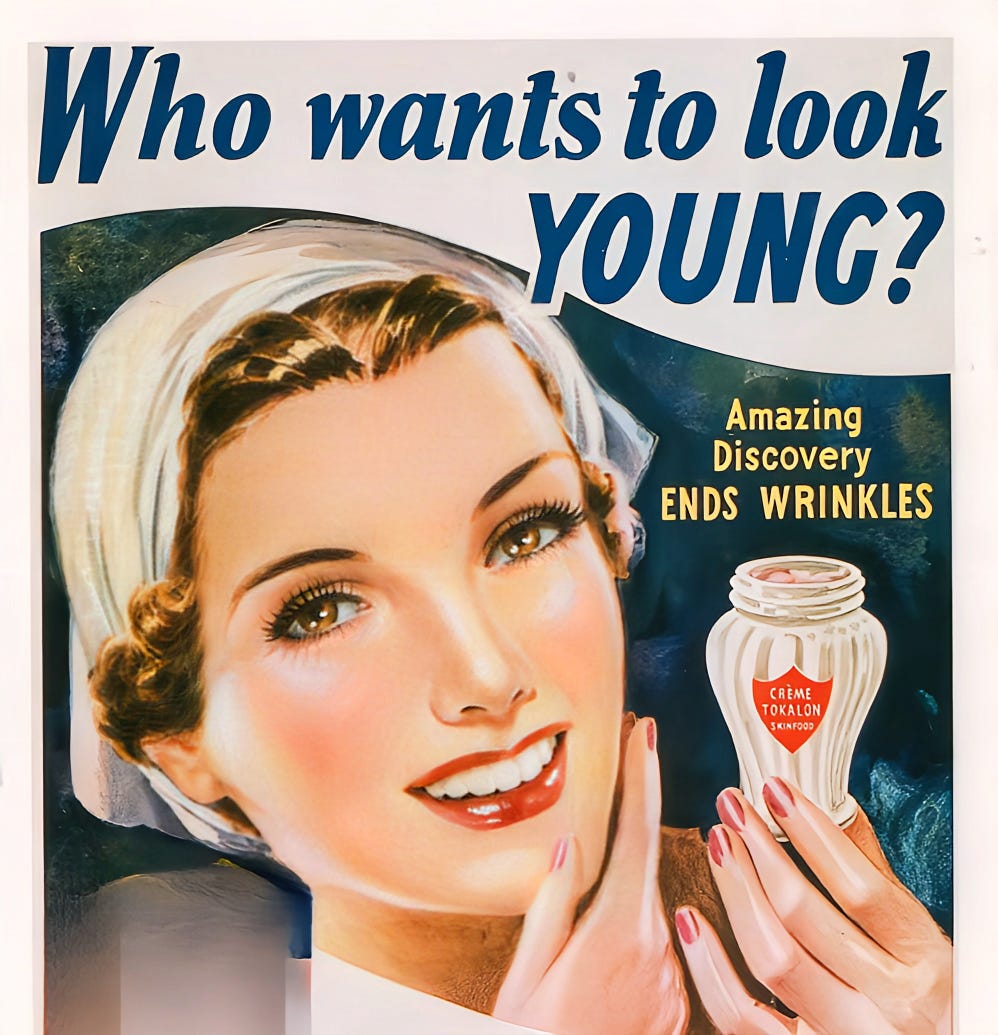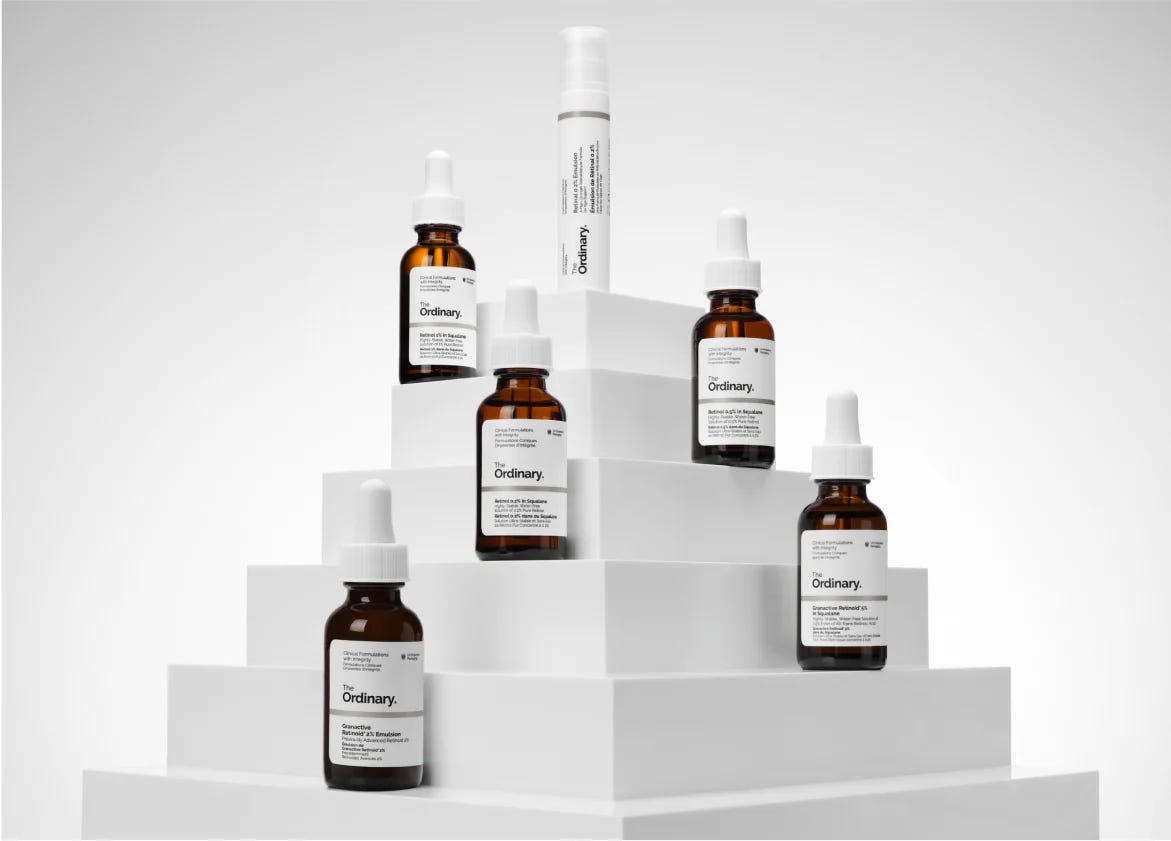So… WTF is it?
Retinol is a skin care ingredient. It’s a low concentration form of Vitamin A that’s available without a prescription.
What’s the point of it? I mean, what does it actually do?
It’s used in the treatment of fine lines and skin tone/texture improvement.
How does it work?
All topical1 Vitamin A skincare products work the same way:
Promote skin cell turnover - i.e. encourage dead skin layers to shed and new cells to grow, meaning your skin is ‘newer’ on the surface
Stimulate Collagen Production -
Reduce inflammation - can improve redness, swelling, and irritation
Fades hyperpigmentation — including melasma, age spots, and acne scars
Retinol is a lower concentration than prescription-strength retinoids, but its properties are the same.
And why would someone want it?
Because they… don’t want fine lines and wrinkles?
Retinol also gets marketed pretty hard by skincare brands as an effective anti-ageing product.
(This is because they’re not allowed to sell you prescription-strength Vitamin A)
How much is it?
Retinol is relatively cheap as an ingredient - The Ordinary have a variety of concentrations starting at around £$8.
As ever with skincare, some companies will charge you a lot more if you let them get away with it. Here’s a retinol for £325 if you’re feeling sprauncy.2
Does it hurt?
No. As with much skincare, if you use too high a concentration then you may experience skin irritation (probably redness and flakiness), but retinol definitely shouldn’t hurt
Have I used it?
Yes, but not in any meaningful/sustained way. I dabbled in The Ordinary and that Vichy eye cream that everyone stanned in the 90s.
Would I use it?
My scorching hot take here is that it’s too late for retinol if you already have visible lines and wrinkles.
I don’t think it’s harmful and I don’t avoid it, but I think most of 35 have already aged out and should be using either prescription-strength vitamin A, Botox or mechanical means (lasers, microneedling etc) to reduce the appearance of wrinkles.
It’s not bad. But it’s probably a waste of money for the over-35s if the outcome you’re looking for is a reduction in lines.
Should you have it?
This is between you and your wallet. IMO you’ll get better bang for your buck from other ingredients/methods.
Also, Vitamin A products increase your skin’s sensitivity to the sun, so this may not be the ingredient for you if you get a lot of sun exposure.
You should always use SPF if you’re using retinol products3.
Anything else I think you should know?
Retinol is available over the counter in concentrations of 0.01-1%. The percentage denotes the concentration by weight of pure retinol in the formulation
The temptation with skincare is always to start with the highest concentration, with the distorted logic that this will be the highest efficacy.
If you’re new to retinol, start with the lowest concentration and work your way up. Don’t shock your skin. No higher than 0.1% for your first try and definitely lower if you have sensitive skin.
It will likely take 2-3 months of consistent use to see a visible improvement. Do not increase the concentration until you’re past the 3-month mark.
Some people absolutely love A313 cream, which is at the lower concentration end (0.12%).
It’s cheapest in France, but is easily available all over the world for around £$25. I actively loathe this stuff - it makes my skin feel claustrophobic - but it has thousands of adoring fans, so it would be remiss of me not to mention it.
Final reminder: You shouldn’t combine vitamin A and vitamin C products in the same routine. You can do Vit C in the morning and retinol at night.
I write about it here:
And I tell you why Vitamin C products probably aren’t worth your time here:
Until next time! x
Disclaimer: ‘WTF is…’ guides are intended to be a 3-5 minute introduction to a topic. They are, by their nature, not exhaustive.
If you have a concern that I’ve irresponsibly included/omitted information, don’t hesitate to get in touch to let me know and I’ll take a look.
Reminder that any cosmetic work undertaken should be in accordance with The 6 rules of cosmetic work. Here they are, in case you missed them the first time…
i.e. externally applied to the skin
This feels like an opportune time to drop this in again
I mean… most would tell you that you should be using sunscreen daily regardless.













Another informative read. Note to self: stop buying retinol 😂